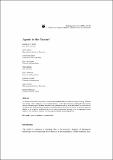Agents to the Rescue?
| dc.contributor.author | West, Patricia M. | |
| dc.contributor.author | Ariely, Dan | |
| dc.contributor.author | Bellman, Steve | |
| dc.contributor.author | Bradlow, Eric | |
| dc.contributor.author | Huber, Joel | |
| dc.contributor.author | Johnson, Eric | |
| dc.contributor.author | Kahn, Barbara | |
| dc.contributor.author | Little, John | |
| dc.contributor.author | Schkade, David | |
| dc.date.accessioned | 2002-09-17T19:59:36Z | |
| dc.date.available | 2002-09-17T19:59:36Z | |
| dc.date.issued | 1999 | |
| dc.identifier.uri | http://hdl.handle.net/1721.1/1676 | |
| dc.description.abstract | The advent of electronic environments is bound to have profound effects on consumer decision making. While the exact nature of these influences is only partially known it is clear that consumers could benefit from properly designed electronic agents that know individual users' preferences and can act on their behalf. An examination of the various roles agents perform is presented as a framework for thinking about the design of electronic agents. In addition, a set of goals is established that include both outcome-based measures, such as improving decision quality, as well as process measures like increasing satisfaction and developing trust. | en |
| dc.format.extent | 91000 bytes | |
| dc.format.mimetype | application/pdf | |
| dc.language.iso | en_US | |
| dc.relation.ispartofseries | Marketing Letters;10:3 (1999): 285±300 | |
| dc.subject | agents | en |
| dc.subject | consumer choice | en |
| dc.subject | e-commerce | en |
| dc.title | Agents to the Rescue? | en |
Files in this item
This item appears in the following Collection(s)
-
Ford-MIT Alliance
Institute-wide collaboration focusing on statistical engineering, virtual education, and the environment
